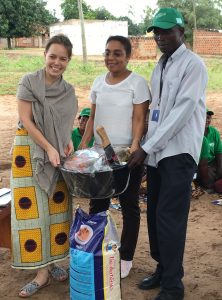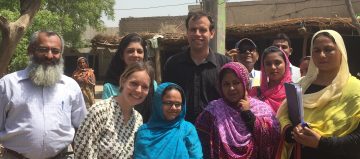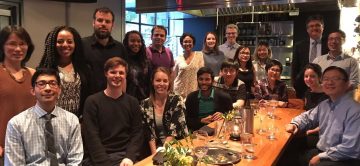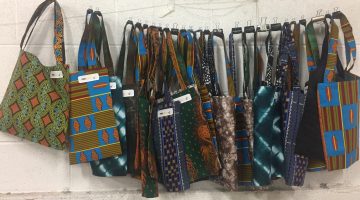 Tell us about your job; what do you do?
Tell us about your job; what do you do?
I am a Research Manager based in Vancouver working in global maternal health with a particular focus on Pre-eclampsia in Sub Saharan African and South Asia. Learn more about the PRE-EMPT project Marianne works on.
Do you travel?

Every two months or so I go abroad to meet the research teams in the countries we work with; or for conferences and team meetings. Travel from Vancouver to the countries we work with isn’t very convenient but it is definitely one of the most rewarding parts of the work. I really enjoy seeing the work on the ground.
How did you get involved in the PRE-EMPT project?
I was in the last semester of my Master of Public Health at Simon Fraser University with a focus on Global Maternal Health and I blindly applied for a Research Assistant position on the PRE-EMPT project because global health is something that I am passionate about. Really I got lucky because I joined the project more or less at its inception and my role grew with the project.
Why did you study a Master of Public Health?
I was always interested in international work. I did my undergraduate degree in Health Studies and Psychology and some women’s studies. Essentially, the social determinants of health and I knew that I wanted to study women’s health.
You completed a PhD while working on PRE-EMPT – tell us more about that
Yes, it wasn’t something that I set out to do but when the opportunity to turn what I was doing for work into a PhD project and thesis with the OBGYN’s department of Reproductive and Developmental Sciences program, it seemed silly not to take advantage of the opportunity. It is certainly a busier way to do your PhD! But with some of our international collaborators on my committee and access to a supportive team and encouragement – it definitely made for a richer experience. It also provided me with the opportunity to learn some skills.
What skills did you learn from doing your PhD?
I was really able to own and push forward my own project – Community perceptions of pre-eclampsia in Mozambique, Pakistan, India and Nigeria – and mold it in my own way. Plus I honed my academic skills in writing and presentation and I got to be one of the experts in our group in that area.
How did you balance your work and PhD?

I had to get comfortable delegating – and be accepting of not having things done exactly how you would do them, exactly when you would want. Also I am very fortunate to work with an amazing strong team that has worked together for a long time.
What would you be doing if you weren’t working on the PRE-EMPT project?
I think that I would be abroad somewhere. If not in women’s health research then in advocacy work somewhere.
What do you do when you are not at work?
I play with my zoo! I have two dogs – a Boston Terrier and a Pug, and three cats – two Persian cats and an exotic short hair. Before this job I loved to travel but now with all the travel that I do with work I enjoy being at home – sewing, knitting, doing needle work and some pottery – basically “old lady” crafts!
Speaking of crafts – did you and the PRE-EMPT team sew bags for the final meeting? How did that come about?

Yes, we sewed 200 cloth bags – it took three months! We always have been hosted so graciously in our travels and all of the countries we work with. They have such beautiful fabrics it seemed like a good way to highlight all the countries and I thought it would be fun for our team to work together on something a little bit different. It was fun! But I am glad we did it for the last meeting and not the first… it would be hard to top! Watch “The story of the PRE-EMPT 2017 Annual Meeting Bags.”
The PRE-EMPT project is winding down – what’s next for you and the team?
Well, it is an exciting time and a big shift from a mammoth project to some smaller international projects – some with the same team leads (Peter von Dadelszen and Laura Magee – now based in King’s College London); and some with other team leads Mark Ansermino, Ken Lim, Kishore Mulpuri, Astrid Christoffersen-Deb and also with the Centre for International Child Health.
We definitely plan to continue to move the global health agenda forward from Vancouver and build from all that we learned working on PRE-EMPT.
What key lessons have you learned from working on PRE-EMPT?
Global health is complex – everywhere is unique and has its own challenges and opportunities.
Take your time – to plan accordingly and build relationships
Ask women (or the recipients of the planned care) and listen to what they identify and the needs and priorities.
Interested in learning more?
Dr. Peter von Dadelszen, the PI of PRE-EMPT, gave two talks in Vancouver about community based interventions to reduce pre-eclampsia in low- and middle- income countries – a Healthy Starts seminar on ‘The Community Level Interventions for Pre-eclampsia (CLIP) Trials’ on May 23 and a BC Women’s Hospital Interprofessional Grand Rounds on ‘PRE-EMPT’s Global Trials Results’ on May 24. A video recording of the May 24th presentation can be seen here.